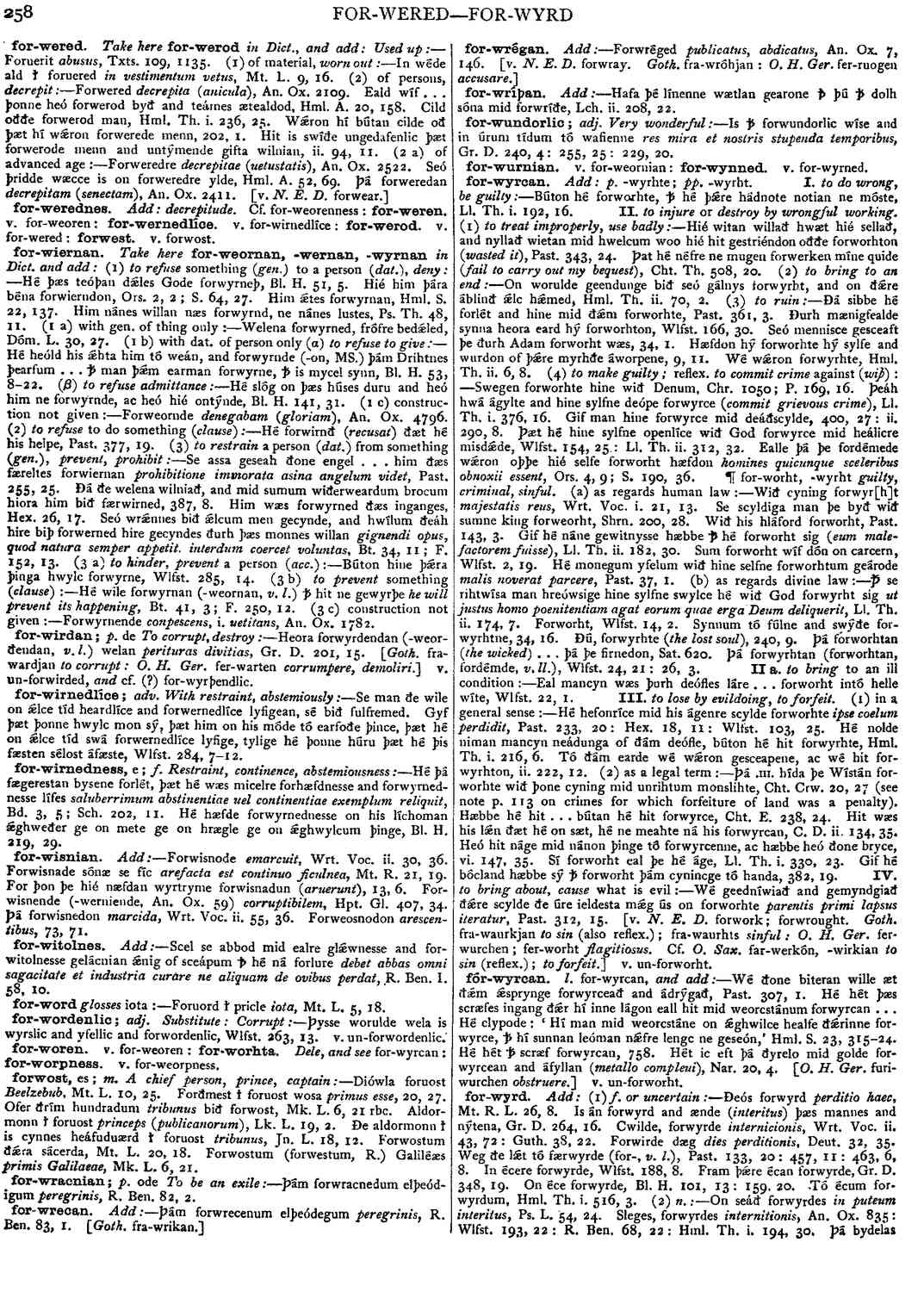for-wyrcan
- verb
-
Búton hé forworhte, ꝥ hé þǽre hádnote notian ne móste,
- Ll. Th. i. 192, 16.
-
Hié witan willað hwæt hié sellað, and nyllað wietan mid hwelcum woo hié hit gestriéndon oððe forworhton (
wasted it
),- Past. 343, 24.
-
Þat hé néfre ne mugen forwerken míne quide (
fail to carry out my bequest
),- Cht. Th. 508, 20.
-
On worulde geendunge bið seó gálnys forwyrht, and on ðǽre áblinð ǽlc hǽmed,
- Hml. Th. ii. 70, 2.
-
Ðá sibbe hé forlét and hine mid ðǽm forworhte,
- Past. 361, 3.
-
Ðurh mænigfealde synna heora eard hý forworhton,
- Wlfst. 166, 30.
-
Seó mennisce gesceaft þe ðurh Adam forworht wæs,
- 34, 1.
-
Hæfdon hý forworhte hý sylfe and wurdon of þǽre myrhðe áworpene,
- 9, 11.
-
Wé wǽron forwyrhte,
- Hml. Th. ii. 6, 8.
-
Swegen forworhte hine wið Denum,
- Chr. 1050; P. 169, 16.
-
Þeáh hwá ágylte and hine sylfne deópe forwyrce (
commit grievous crime
),- Ll. Th. i. 376, 16.
-
Gif man hine forwyrce mid deáðscylde,
- 400, 27: ii. 290, 8.
-
Þæt hé hine sylfne openlíce wið God forwyrce mid heálicre misdǽde,
- Wlfst. 154, 25: Ll. Th. ii. 312, 32.
-
Ealle þá þe fordémede wǽron oþþe hié selfe forworht hæfdon
homines quicunque sceleribus obnoxii essent,
- Ors. 4, 9; S. 190, 36.
- ¶ for-worht, -wyrht guilty, criminal, sinful.
-
Wið cyning forwyr[h]t
majestatis reus,
- Wrt. Voc. i. 21, 13.
-
Se scyldiga man þe byð wið sumne king forweorht,
- Shrn. 200, 28.
-
Wið his hláford forworht,
- Past. 143, 3.
-
Gif hé náne gewitnysse hæbbe ꝥ hé forworht sig (
eum malefactorem fuisse
),- Ll. Th. ii. 182, 30.
-
Sum forworht wíf dón on carcern,
- Wlfst. 2, 19.
-
Hé monegum yfelum wið hine selfne forworhtum geárode
malis noverat parcere,
- Past. 37, 1.
-
Ꝥ se rihtwísa man hreówsige hine sylfne swylce hé wið God forwyrht sig
ut justus homo poenitentiam agat eorum quae erga Deum deliquerit,
- Ll. Th. ii. 174, 7.
-
Forworht,
- Wlfst. 14, 2.
-
Synnum tó fúlne and swýðe forwyrhtne,
- 34, 16.
-
Ðú, forwyrhte (
the lost soul
),- 240, 9.
-
Þá forworhtan (
the wicked
) ... þá þe firnedon,- Sat. 620.
-
Þá forwyrhtan (forworhtan, fordémde, v. ll.), Wlfst. 24, 21: 26, 3. II a.
to bring
to an ill condition :-- Eal mancyn wæs þurh deófles láre ... forworht intó helle wíte,- Wlfst. 22, 1.
-
Hé hefonríce mid his ágenre scylde forworhte
ipse coelum perdidit,
- Past. 233, 20: Hex. 18, 11: Wlfst. 103, 25.
-
Hé nolde niman mancyn neádunga of ðám deófle, búton hé hit forwyrhte,
- Hml. Th. i. 216, 6.
- Tó ðám earde wé wǽron gesceapene, ac wé hit forwyrhton, ii. 222, 12.
-
Þá .iii. hída þe Wístán forworhte wið þone cyning mid unrihtum monslihte,
- Cht. Crw. 20, 27 (see note p. 113 on
-
Hit wæs his lǽn ðæt hé on sæt, hé ne meahte ná his forwyrcan,
- C. D. ii. 134, 35.
- Heó hit náge mid nánon þinge tó forwyrcenne, ac hæbbe heó ðone bryce, vi. 147, 35.
-
Sí forworht eal þe hé age,
- Ll. Th. i. 330, 23.
-
Gif hé bócland hæbbe sý ꝥ forworht þám cynincge tó handa,
- 382, 19.
-
Wé geedníwiað and gemyndgiað ðǽre scylde ðe úre ieldesta mǽg ús on forworhte
parentis primi lapsus iteratur,
- Past. 312, 15.
Bosworth, Joseph. “for-wyrcan.” In An Anglo-Saxon Dictionary Online, edited by Thomas Northcote Toller, Christ Sean, and Ondřej Tichy. Prague: Faculty of Arts, Charles University, 2014. https://bosworthtoller.com/46172.
Checked: 0